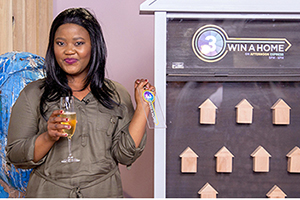
Palesa Moisi, winner of the Win A Home
competition on the Afternoon Express
Show on SABC 3.
Photo: Win A Home
The saying “Dreams do come true” is a perfect explanation for 25-year-old Palesa Moisi who was announced winner of the Win A Home competition.
Palesa, who is currently completing a Postgraduate Certificate in Education at the University of the Free State, is the proud owner of a beautiful apartment worth almost R3 million. The day after the announcement, she was escorted to the Val de Vie Estate to pick her dream apartment from three beautiful designer apartments.
Proud owner of apartment at Val de Vie
With Win A Home Season 3 on SABC 3’s Afternoon Express, viewers not only stood a chance to win bi-weekly prizes, but Palesa walked away with a two-bedroomed furnished apartment in the Polo Village at the prestigious Val de Vie Estate in the Paarl-Franschhoek Valley near Cape Town. The draw took place on 26 August 2016 at the Afternoon Express Studios.
Time stood still for a moment
Palesa says when she stepped towards the safe, which each contestant was assigned to, and opened it, everything just stood still. A key to the apartment was inside one of the safes. “My mind was somewhere else and when I saw the key I realised: ‘Hey I need to take it out and show it to everyone’.”
Financial constraints are a big issue for her family. Her mother is a single parent and Palesa has a younger sister who needs to be cared for. “I’m still a student and I think that if I rent out the house for now, I will be able to pay for my fees and take some pressure off of my mother,” she says.